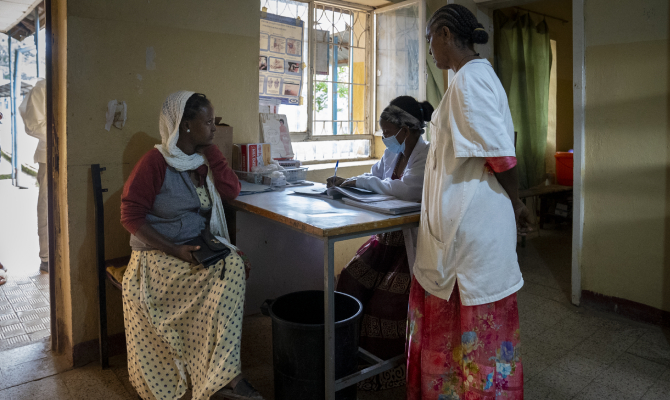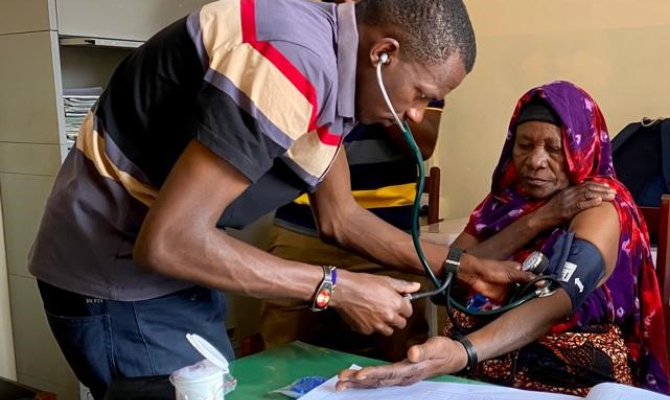“Once upon a time there was a little red bike that felt as fast as a racing car”. This is the story of a red bike with broken wheels unable to perform as it wish. Actually, it is more than this. This is the story of a child who suffers from undiagnosed health conditions and rides his red bike. Actually, it is way more than that. It is the story of a collaboration between the “A. Frattini” Arts High School in Varese and a little town in Mozambique, named Quelimane, where Doctors with Africa Cuamm works to tackle “Noncommunicable diseases”, with the support of the World Diabetes Foundation.
This story is about diabetes, especially type 1, that affects particularly children and the young. Maura Lucchini is an internist from Varese, she is 48 years old and mother of two. Previously, she spent two years in Uganda with CUAMM, three years in South Sudan, one year in Mozambique. Maura chose to invest her time and energies on this project because she thinks it is worth it.
“I started by training – says Maura, because this is a neglected disease. From August on, I have worked with doctors, nurses, nutritionists and psychologists both from Quelimane, in the province of Zambesia and Beira, Sofala province. I am now meeting the activists who works within the communities. We take care of the patients who get to the hospital when their health conditions aggravated. This is not enough. We have to go seek the patients in suburbs, villages and schools because type 1 diabetes is a hidden yet life-threatening disease, hence it is crucial to shed a light on it through the work of the activists”.
Africa is experiencing an increasing prevalence of noncommunicable diseases even though data are few and incomplete. In the sub-Saharan Africa region, less than one in 10 countries has published data on the incidence or prevalence rates of young people with type 1 diabetes. In Ethiopia, for example, the annual incidence was estimated at 2.1/100,000 (1995-2008) and in Tanzania and 1.8-1.9/100,000 (2010-2015).
Continuous and consistent follow-up of patients is limited, and many children and youth die before being diagnosed or accessing treatment, also contributing to the low incidence and prevalence rates estimated. This is where the commitment of Doctors with Africa CUAMM in providing health care and training comes from. Caring patients who seek treatment and training health workers and activists is a time-consuming effort that does not bring valuable results in a short time yet, it represents the commitment to the promotion of development for the future of the next generations.
What makes a difference, once again, is community outreach activities. And because good begets good, Maura dragged her friend Andrea and his students into this adventure.
“Andrea is a friend, says Maura, he is a teacher and member of both a theatre company and a band where also Alessandro plays, he was diagnosed with type 1 diabetes at the age of 16”.
By telling them about my job, we came up with the idea of engaging his students from the class I H, in writing a play script. Performances are an effective mean to train and educate in Mozambique, that is why once I received the script about the red bike and the “Wheelness”, I had it translated into portuguese and scheduled the exhibition to perform both in Quelimane on January 27th and in Biera on 31st in occasion of two health fairs dedicated to diabetes. Hoping that one day at least Andrea and Alessandro, if not the students themselves, will visit us here to witness what we have done, together”.
On these two days, in addition to the play, a multidisciplinary team (pediatrician, general practitioners, nutritionists, psychologists, nurses) informed the children and personal kits with a backpack, glucometer, notebook, and colored pencils were handed out.
Beside, a radio commercial also designed by the Frattini High School students and translated into local dialects was broadcast by local radios.
Students from Varese claimed:
“We enjoyed participating in this project and it is nice that it is coming to fruition. We hope that we can be useful to someone in the world, in our own way. This experience tought us to better use words, as we knew we were addressing them to sensitive people far away from us. It’s good to try to turn sensitivity into strength, to care and to heal, to keep going and never give up.” Finally, Prof. Minidio concludes, “A school that is open to dialogue and debate with the world can enable us to achieve the educational goals set by the UN Agenda 2030.”





